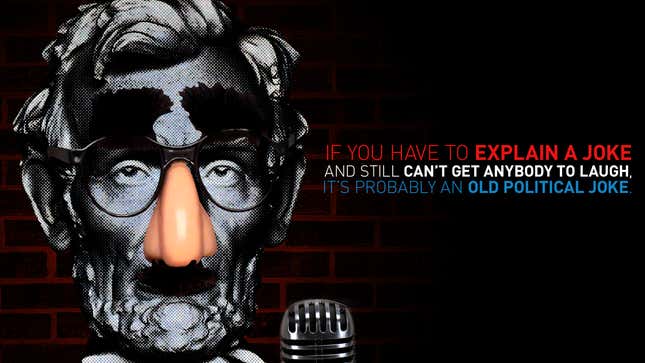
Disclaimer: Any assumption that the political jokes contained in this article are funny will lead to disappointment.
Donald Trump bombed at this year’s Al Smith Dinner. He’s believed to be the first speaker ever booed at the charitable New York event, which for the last half century has given major-party presidential nominees one last chance to show their humorous side before voters weigh in. Hillary Clinton, taking the dais after Trump’s fabulous failure, was too bland to boo.
The dinner, in other words, reflected the 2016 campaign, in which jokes have been as invisible as yard signs. To date, neither candidate has served up any laff lines worth recounting from the stump. Lots of folks surely giggled upon hearing Trump’s “That wall just got 10 feet higher!” and Hillary’s “basket of deplorables,” but neither remark was originally intended as a bon mot.
The pervading jokelessness likely irks me more than the next guy, because there was a time when I dabbled in presidential campaign humor.
Take my jokes, please!
Here’s Al Gore on David Letterman during his 2000 run for the presidency, spouting something from me while reciting a list of the top 10 rejected Gore-Lieberman campaign slogans:
What’s my line? “Vote for us, we’re going to work 24/6!”
Not funny in 2016? Well, see, Gore’s vice-presidential running mate was Joe Lieberman, and Lieberman had spent much of the campaign talking up his faith, and hammering home how he was so devout that he wouldn’t work on the Jewish Sabbath even if elected, and so that would leave just six days a week to do the country’s business, and so … Oh, never mind.
Rule No. 1 about old political jokes: If you have to explain a joke, and still can’t get anybody to laugh, it’s probably an old political joke.
I’ve mulled the current state of political humor since late summer, when Sen. Al Franken (D-MN) got in trouble for trying to be funny. Franken was at the state fair when a reporter asked for his reaction to the news that Teddy Bridgewater, the beloved quarterback of his hometown’s pro football team, had just blown a knee. “It’s like finding out Hillary’s having an affair with Anthony Weiner,” Franken responded, according to Mark Leibovich of the New York Times.
Decent line—timely, sorta edgy, revealed his political allegiances, etc.—especially for talking off-the-cuff. But Franken, who was a Saturday Night Live legend long before running for office, got so much heat for it that he apologized. “Pretty insensitive and stupid of me,” Franken said.
Franken was Gore’s top joke writer for the 2000 campaign. His Bridgewater troubles inspired me to search my basement for evidence of my own joke-writing escapades. I found a bag of gag memorabilia. Alongside a VHS copy of Gore’s appearance on Letterman, there was a script from the 1995 Gridiron Dinner. That’s where it all got started for me. At that time, I was in an awful D.C. bar band with Eli Attie, now a Hollywood producer and writer, but then the wunderkind speechwriter for Congressman Richard Gephardt (D-MO), the onetime House Minority Leader and serial Presidential contender in his own mind. (Gephardt’s retired, and Eli’s across the country, but the band’s still around, and still awful.)
Gephardt was scheduled to be a featured speaker at that year’s Gridiron, alongside President Bill Clinton, First Lady Hillary Clinton and ex-drug czar/ex-Secretary of Education Bill Bennett. My bandmate, probably from seeing how hard I tried to be funny during rehearsals, told me Gephardt needed jokes, and that I could donate some lines if I wanted.
I’d never written a joke before. But I’d spent my whole life inside the Beltway, where the Gridiron Dinner was a huge deal. Those soirees gave journalists and politicians—the top local celebrities—an excuse to mingle and get goofy since the late 1800s. Into the 1990s, the Gridirons were still the biggest political joke-telling event on the social calendar. (The White House Correspondents Dinner, where real celebs from the outside world now show up, has since eclipsed the Gridiron.)
No pay was offered.
Turns out that, with a few exceptions, candidates get their political jokes pro bono. There were, of course, ethical concerns that kept journalists—a major font of jokes at D.C. political dinners—from taking money. Even pros like Franken and Doug Gamble, a writer for Bob Hope in Hollywood who gave jokes to President Ronald Reagan, usually worked for the same wage as anonymous putzes like me. But money didn’t matter. This was, well, starfucking, D.C. style. I told Eli I’d try to help.
At least in my case, Gephardt got what he paid for. I remember turning in some lines about Rush Limbaugh’s weight—common fodder for political joke writers in the mid-1990s. But, from reading the script, I saw no Limbaugh lines made the cut. I can only imagine how horrendous the rejected jokes were by judging from those that made it.
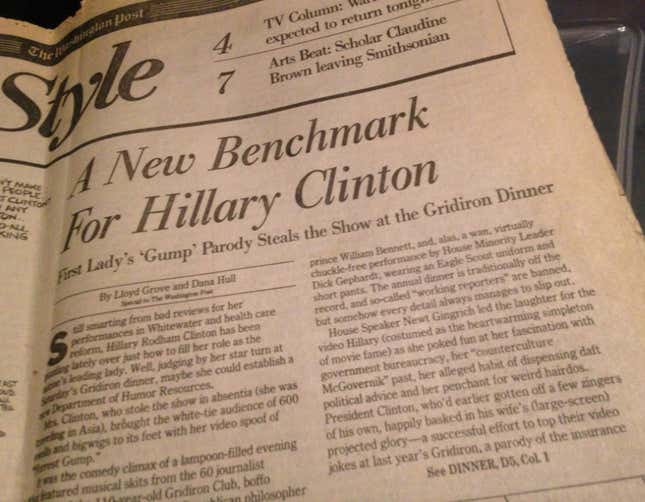
One of my jokes that Gephardt did utter was an attempted dig at Bennett, a blowhard Republican who was both a wannabe moral compass and a celebrated “relentless” gambler. At the time, he was the best-selling author of a pious memoir titled The Book of Virtues: A Treasury of Great Moral Stories. I’d turned in a tome-length set-up for a joke that had Gephardt pointing out that drug abuse in the U.S. went up when Bennett was drug czar, and SAT scores went down when he ran the Department of Education. “If he’d stayed Secretary of Education much longer,” Gephardt said, “he’d have had to put out a pictures-only version of The Book of Virtues.”
And that Bennett, um, gag was my best line! My memorabilia bag also holds a mouse-eaten and yellowed copy of the March 27, 1995, edition of the Washington Post. The Saturday night dinner where Gephardt used my lines had ended too late for the next day’s newspapers. So, this being in the pre-internet, pre-Twitter age, I had to wait until Monday morning to read the Post’s post-mortem on the Gridiron’s performances. On Sunday, I was like some Broadway ingenue, sleepless and waiting for the opening night notices to come in. I was at a convenience store in my neighborhood shortly after sunrise buying a newspaper.
I remember ripping out the Post’s Style section, and there was the Gridiron story, on the front page, above the fold. And scanning past the opening, which said Hillary needed a good showing to make up for “Whitewater and health care reform,” and, boy, did she deliver. Post reporters Lloyd Grove and Dana Hull went on to say Hillary “stole the show” with a Forrest Gump parody, and that her other gags left the audience “convulsed with laughter;” the review even featured a GOP star, Gov. Pete Wilson of California, praising her routine as “dynamite.”
Then came kudos for Bennett, who the writers asserted had a “boffo” routine. Grove and Hull also had lots of words of praise for President Bill Clinton’s remarks, and called an ensemble a “crowd pleaser” for performing a musical skit lampooning Joycelyn Elders, the newly-former Surgeon General who got canned for praising masturbation even after being warned to lay off the topic.
Everybody was killing it!
Well, make that everybody but my guy: “Alas,” Grove and Hull wrote, “a wan, virtually chuckle-free performance by House Minority Leader Dick Gephardt.” Turns out Gephardt delivered a “routine rife with wooden, slightly nasty attacks” that “raised more eyebrows than smiles.” President Clinton took to the podium to mock Gephardt’s unfunniness. Jane Gephardt, his wife, was “overheard sighing” while her spouse drowned in public. “Dick’s just not funny—everybody knows that,” she said.
“Wan”? “Chuckle free”? The guy using my jokes was so unfunny that even his wife and the President of the United States busted on him? Damn. I cringed for Gephardt and, mostly, myself all over again re-reading the script and the Post’s review after all these years. I had forgotten that Gephardt had sabotaged his routine before it began, by showing up in a Boy Scout uniform for unknown and unfunny reasons. But the script proved his writers hadn’t done him any favors, either. It was all coming back to me how friends got me back for my pre-Gridiron brags about being so inside the Beltway by dubbing me “Obi-Wan” and “Chuck Free” after the Post’s review came out. Their nicknames were funnier and more durable than any of my Gephardt jokes.
In a 2010 retrospective of Gridiron jokesters, Slate’s Christopher Beam suggested that Gephardt’s 1995 routine was “the greatest flop in recent memory.” My jokes were so bad they defined failure.
Horrific as my debut surely was, I kept trying to write jokes after the 1995 Gridiron. I found trying to turn current events into a set-up and punchline was a fine brain exercise, like doing a crossword puzzle, only with the possibility of ego-feeding feedback not available to puzzle-doers. So for years, whenever any political staffers asked for contributions, I’d try to oblige with some laff lines. I stuck around long enough do some jokes for Vice President Joe Biden, including the one he led off with at the 2010 Radio and TV Correspondents Dinner: “I love to travel,” Biden said. “But it’s great to be back in a place where a boom in housing construction is actually a good thing.”
See, before the dinner the vice president had just returned from Israel, where he’d found himself in the middle of a diplomacy debacle, because soon as Biden landed Prime Minister Benjamin Netanyahu tried exploiting the international publicity generated by the VP’s visit by announcing the building of 1,600 more homes in contested East Jerusalem, and … Oh, never mind all over again. (See Rule No. 1 above.)
While nobody will slap their knees over Biden’s quip in 2016, at the time, the Washington Post liked it, and the VP’s opener was even newsworthy in Israel for a day or so. Again, there’s no money in this game, so there was an unhealthy level of craving for those notices.
I worked some more Gridirons, too—not always intentionally. Sarah Palin is still getting raves for her 2009 routine at the D.C. dinner. The Hill, a D.C.-based Congress-centric publication, ran a story this past February about the historic significance of the dinner, referencing the former Alaska governor’s using the event to show she can deliver a punchline, not just be one. The joke that the Hill cited at the top of its look-back piece, and the one that got the most notice in writeups at the time, was Palin’s opener about how “at home” she felt in the city:
“[Palin] surprised listeners with a witty, charming, self-deprecating performance where she poked jabs at ... herself.”
“It’s great to be here,” she said, at the start. “From my hotel I can see ... the Russian Embassy.”
That was my joke! Well, sorta. Not long before the 2009 Gridiron, I had given Biden’s speechwriters a nearly identical line, for a speech he was giving at the Jefferson/Jackson Dinner, an Iowa affair that gets the next presidential campaign going. It was a riff on the reasons Biden loved being vice president, among them the sweet location of the VP’s residence. “I know why Sarah Palin wanted my job,” Biden would have said. “Now, I can see the Russian Embassy from my house.” It played off one of the defining gaffes of Palin’s 2008 gaffe-friendly campaign for the vice presidency. When ABC’s Charles Gibson suggested that she lacked the foreign policy experience for such high office, she protested and said, “You can actually see Russia from land here in Alaska.”
No joke about it could be as funny as Palin’s original line, but it made for easy fodder. But right before the Jefferson-Jackson dinner, Biden had decided the times were too tough to do any jokes, and instead he’d railed against Tea Party influence in Washington and pumped up the Obama administration’s efforts to kickstart the economy. I was bummed that my labors had gone for naught. Then, just a couple weeks later, I read a story on the web about Palin wowing the Gridiron crowd that made me feel even worse. The article said she led off her routine with that Russian embassy joke. I knew that others had used that same Palin gaffe for punchlines through the years—Saturday Night Live’s being the most famous—but I still thought it was weird how it got across the aisle so soon after Biden’s squandered joke-collecting effort.
So just after reading the text of Palin’s routine, I emailed Biden’s joke team and said, “I smell a rat! And a mole!” And I got a message back from a speechwriter for the vice president saying, yeah, Palin got it from us. Turns out Palin’s superagent and D.C. aisle-crossing rainmaker, Bob Barnett, had called Biden’s people and said she really needed some lines for the Gridiron, and my Russian embassy line was still lying around, so they let the face of the GOP have it. (CNN reported in February 2010, two months after the Gridiron, that Palin had paid a Democratic consultant who was part of Biden’s joke-writing team $14,000 to make her look good at the dinner. I didn’t know about that payment until this past week, or I would have asked for a cut.)
At that time, the joke giveaway seemed like high treason; I’d never have agreed to help Palin. Well, at least not pro bono. But, I must say, I liked the attention the line got. Plus, the episode reminded me how Washington really works—starfuckery knows no political party.
I’d repurposed some unused campaign jokes on my own. Of the few rules of political joke writing, the most-repeated one was, “Singe, but don’t burn!” That meant, essentially, mean lines almost always come off as unfunny when told to dinner crowds. Trump’s recent bombing at the Al Smith Dinner is a fine example. Gridiron historians blame much of Gephardt’s 1995 debacle on his routine being too mean to the other side. In the political joke-writing realm, self-deprecation kicks plain ol’ deprecation’s ass. (Risqué stuff also rarely made the cut: Before a speech given at the height of the Tiger Woods sex-addiction hysteria, Biden declined a line I’d sent in that had him thanking his staff for “making me turn down that invitation for a foursome with Tiger Woods.” I still kinda like that one.)
So during the 2000 campaign, I was made aware that George W. Bush’s alleged status as a dim bulb and a big drinker were mostly off limits, despite all the attention those topics (including a criminal record) had garnered. I learned this after turning in a joke for Gore about how the differences between George W. and his dad disproved evolution: “We’ve gone from ‘1000 points of light” to ‘1000 Pints of Lite!’” It made me laugh. I’m pretty sure it got rejected before Gore even saw it.
I also was giggling when word of Bush’s DUI arrest from 1976 was reported during the campaign, and was immediately followed by news that Dick Cheney had two drunk driving arrests of his own from his Wyoming days. I knew Gore would never use anything about those incidents. So I sent some lines about the booze news to a staffer at The Tonight Show who had been involved in Gore’s appearances with Jay Leno. One, which I stole from my wife, dubbed Bush and Cheney “Drunk and Drunker.” It made Leno’s monologue, as did a joke I came up with all by myself about how the Republican candidates had finally given America a reason to send them to the White House: “To get them off the road!” (I know, I know. My wife’s the funny one!) I got a $100 check from Leno’s Big Dog Productions that I didn’t share with my wife. I felt like a professional, though Leno never asked me for more material.
My hack status, however, had been assured following the 2000 Gridiron, which featured jokes from Gore. His routine got rave reviews from all over, including a great writeup in the Washington Post in a story headlined “Gore Tames the Gridiron Crowd With an Arsenal of One-Liners.”
While Gore didn’t write checks for joke writers, there were some tangible rewards up for grabs beyond the newspaper stories. If a routine went well, the vice president’s office might send out typed up thank-you letters. And if things were really well received, as those Gridiron gags were, Al himself might add something short and sweet in Sharpie to the otherwise rote note, just to let us know the kudos weren’t all from a machine. (See, despite his media portrayal, Gore was actually a human being.)
I got one of those Sharpie-enhanced notes a few days after the Gridiron, in which Gore thanked me for giving him “quite arguably the best line of the entire evening.” He was referring to a joke about George W. Bush giving a big speech at famously racist Bob Jones University, and then trying to mend fences with some people of color by speaking in really exaggerated Spanish and... Oh, never mind.
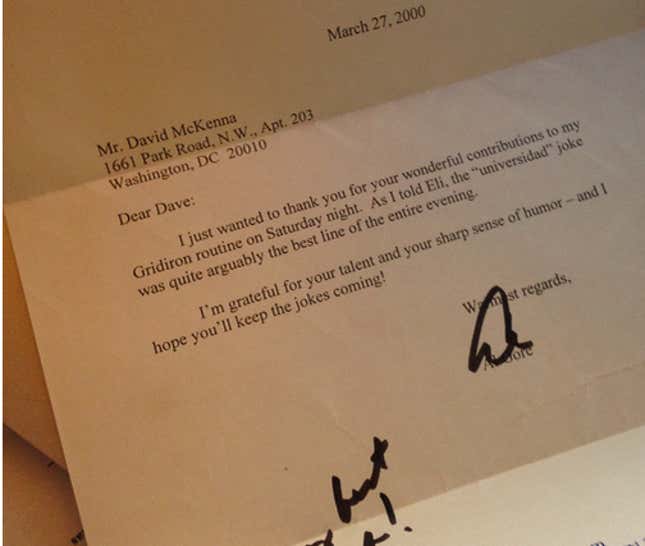
Because I am a small person, reading Gore’s letter (with its Sharpie shout-out to my wife) had me swooning, or whatever you’d call feeling the opposite of how I felt after reading about Gephardt’s Gridiron debacle in the Washington Post. In my gloating state, the night I got the letter I faxed it to a friend, who’d been reminding me of my “chuckle free” notices since 1995. At least, I thought I faxed the letter to him.
The next morning, however, I got a phone call from Jeannette Walls, now a hugely popular memoirist, but at the time the writer behind The Scoop, MSNBC’s gossip column. Walls told me somebody had given her Gore’s letter—turns out I’d transposed the last two digits in my friend’s fax number and that somehow reached, according to Walls, the fax machine of “a friend” of her column. She asked me if the letter was an admission from the vice president that he didn’t write his own jokes.
I thought Walls was joking, since nobody with a brain believed politicians came up with their own speeches. But she kept up that line of questioning, and told me she’d be confirming that Gore was indeed using other people’s jokes with the White House and Gore campaign. So by the time I hung up with her I knew I’d messed up a campaign about as bad as an unpaid, anonymous putz could mess one up. (And with a fax machine! Imagine the damage I would have done if Twitter was around in 2000! This is why I don’t do Twitter in 2016.)
Then I got a call from a Gore speechwriter in awe of my screwup. He told me calmly that Walls was intent on turning Gore’s letter into a big deal in hopes of furthering the prevailing narrative that Gore always took undeserved credit for the work of others. Wall’s Gridirongate scoop, he said, was either “going to blow up into something huge” or be forgotten forever by the end of the work day. I assumed the worst. Sure enough, later that afternoon, the top story on MSNBC’s home page was from Walls, under the headline “Gore’s Great Line Is Not His Own.” Walls’s article accurately had me stammering while trying to say what happens in the joke room should stay in the joke room, alongside a quote from an anonymous alleged Gridiron attendee: “Well, [Gore] took credit for inventing the Internet, why shouldn’t he take credit for being the funniest guy at the Gridiron?”
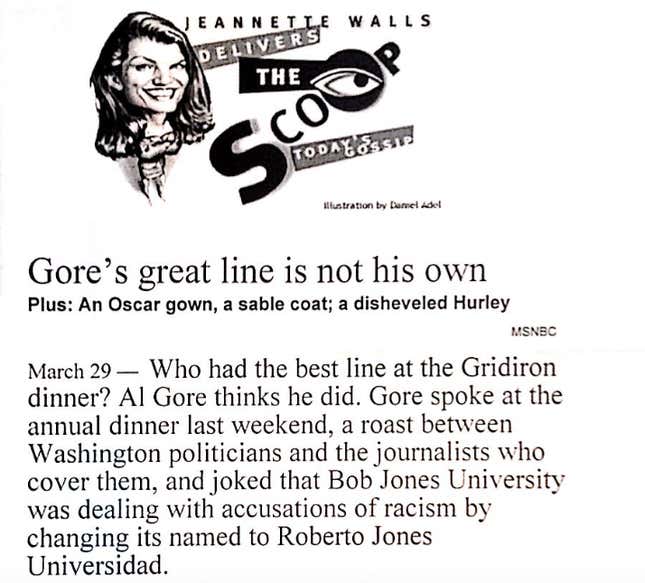
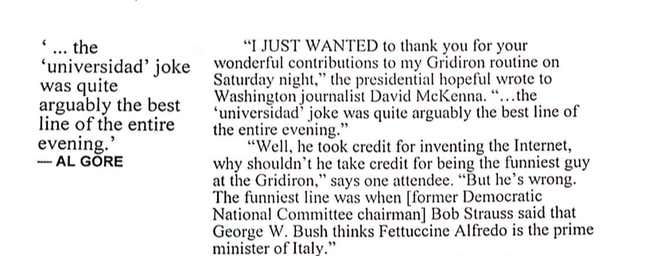
I wanted to jump off a building. But, luckily for me, that scandal had the shelf life of most of the jokes I’d written for Gore; by the end of the workday, it was forgotten. I never again heard anybody outside the campaign mention Walls’s story or my fax faux pas again. In fact, the campaign kept asking me for jokes, and I kept contributing lines, the highlight coming with his September 2000 appearance on Letterman. I was told on the afternoon of the show that Letterman had decided to use just the Top 10 list from his own staff. But during the taping, Gore threw in the “24/6” line anyway, masked as an ad lib. (This is why that punchline didn’t get its own chyron during the broadcast.)
The line got far more attention than anything else I’d turned in to Gore during the campaign. A reporter covering the race told me he saw Lieberman’s staffers wearing “24/6” t-shirts. One Gore speechwriter told me his rabbi back home in New Jersey used “24/6” and cited Gore during a High Holy Days service. During a subsequent conference call with us joke writers, Gore even discussed throwing it into future stump speeches.
So I have those fine memories, despite how the election ended up. But my memorabilia bag has no thank-you note from Gore for writing that Letterman line. After the Gridiron debacle, the campaign clearly felt I could no longer be trusted with a letter from the candidate. That’s still pretty funny.